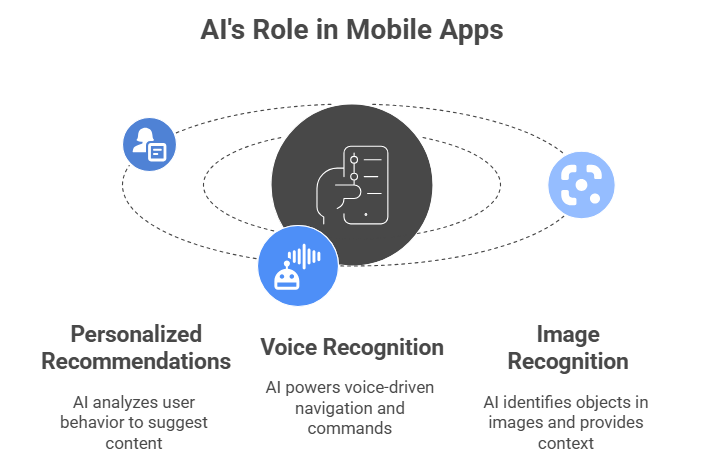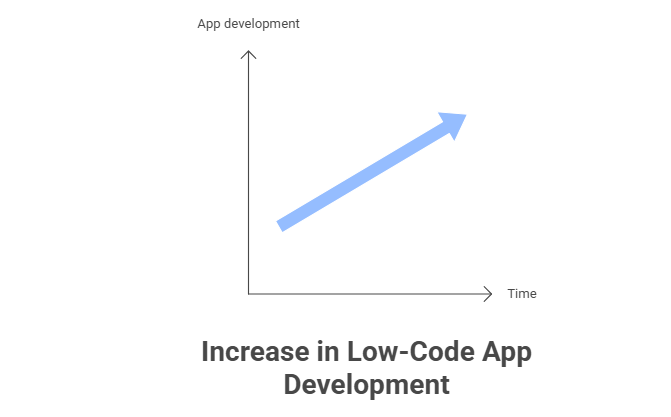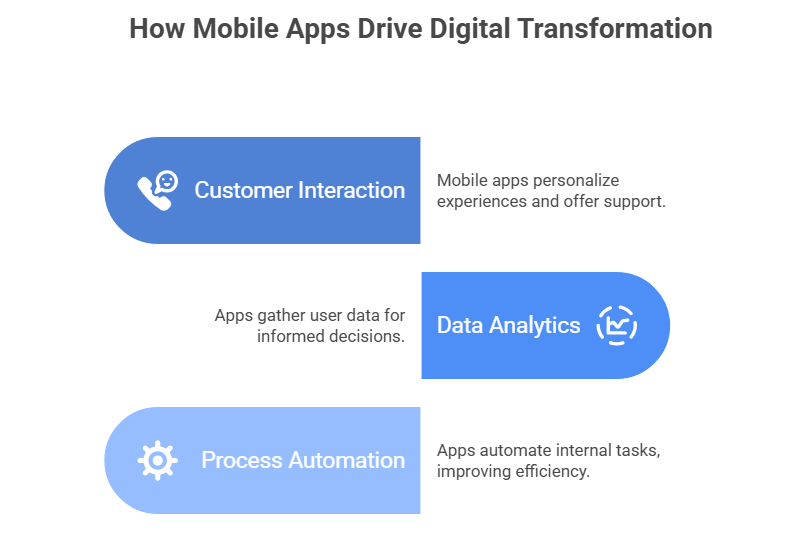What’s New in App Development? Key Innovations to Watch
Mobile app development has come a long way from its humble beginnings. Today, it is a thriving, dynamic field fueled by constant innovation, technological breakthroughs, and consumer demand for advanced experiences. The latest advancements promise to reshape the way apps are developed, interact with users, and operate in the digital landscape.
In this blog, we’ll explore some of the most exciting trends in mobile app development, shedding light on the key innovations that are set to take the industry by storm. Whether you are a developer, business owner, or tech enthusiast, understanding these trends will help you stay ahead of the curve. As a leading mobile application development company, App Maisters is at the forefront of these innovations, helping businesses embrace the latest technologies to create powerful, advance apps. Let’s dive into what’s new in app development and the innovations to watch.
AI in Mobile Apps: Enhancing User Experiences and Automation
Artificial Intelligence is already an integral part of mobile applications, and its role is only growing. Today, AI is not just about providing virtual assistants or chatbots. It is embedded into various aspects of app functionality, improving automation, personalization, and even predictive analytics.

For example, AI is increasingly being used for:
- Personalized Recommendations: Apps like Netflix and Spotify use AI to analyze user behavior and recommend content based on preferences.
- Voice Recognition: Siri, Alexa, and Google Assistant are powered by AI to offer voice-driven navigation and command processing.
- Image Recognition: Apps like Google Lens use AI to recognize objects in images and provide context-based information.
Trending Insight: AI + Machine Learning
The integration of machine learning within AI is making mobile apps smarter. Apps are now able to continuously learn from user interaction and improve the user experience over time. AI-driven apps now have more advanced capabilities, such as facial recognition for security, automated customer service, and data-driven insights for businesses. This trend is also expected to significantly boost customer satisfaction and engagement.
Statistical Insight
According to Statista, the global AI market in mobile applications is expected to reach $28.23 billion by 2027. The demand for AI-powered mobile apps will only continue to rise as businesses embrace digital transformation.
5G App Development: Boosting Speed and Connectivity
The arrival of 5G technology is set to revolutionize mobile app development. With download speeds up to 100 times faster than 4G, 5G offers new opportunities for app developers to create high-performance apps that can handle heavy data loads, complex real-time interactions, and low-latency experiences.
For example, industries like gaming, streaming, and augmented reality (AR) are set to benefit greatly from 5G’s capabilities. Apps that require real-time data exchange, such as live streaming, video conferencing, or gaming apps, will be able to offer smoother, faster, and more immersive experiences.
In addition, 5G enables improved connectivity for IoT (Internet of Things) devices, leading to smarter mobile applications that can sync data more efficiently across multiple platforms. This will enhance mobile app development in various industries like healthcare, logistics, and smart homes.
Augmented Reality (AR) in Apps
Augmented Reality is no longer just a novelty; it’s becoming a powerful tool in mobile app development. AR superimposes digital information onto the real world, enhancing how users interact with their environment. From virtual try-on features in retail apps to educational tools, AR has expanded its reach across a range of industries.
Popular apps like Pokémon Go, IKEA Place, and Snapchat have already set the bar for AR-based experiences, but the potential for AR is far from exhausted. In fact, according to Grand View Research, the AR market is expected to grow at a compound annual growth rate (CAGR) of 43.8% from 2020 to 2030.
For mobile app development companies, AR opens up new avenues for creating engaging and immersive apps. Whether it’s in e-commerce, real estate, gaming, or healthcare, AR is providing users with a more interactive and enjoyable experience.
Low-Code Development Platforms: Accelerating App Development
One of the most significant trends in mobile app development is the rise of Low-Code Development Platforms (LCDPs). These platforms allow developers (and even non-technical users) to build mobile apps without writing extensive lines of code. LCDPs offer drag-and-drop interfaces and pre-built templates, enabling developers to speed up the app creation process.
In fact, Gartner predicts that by 2024, 65% of all app development will be done on low-code/no-code platforms. This shift is making it easier for businesses to launch apps quickly, reduce development costs, and involve more team members in the app-building process.

Benefits of Low-Code Platforms
- Faster time-to-market
- Reduced development costs
- Empowering non-developers to participate in the creation process
- Greater flexibility for iterative design and updates
While these platforms are not a complete replacement for custom development, they are particularly useful for creating MVPs (Minimum Viable Products) or less complex applications.
Cross-Platform Mobile Development
Cross-platform development frameworks, such as Flutter, React Native, and Xamarin, have become popular in recent years due to their ability to let developers write a single codebase for multiple platforms, including iOS, Android, and the web. This reduces the time and cost of building separate apps for each platform.
The Benefits of Cross-Platform Development
- Efficiency: Developers can write code once and deploy it across multiple platforms, saving time and effort.
- Consistency: Cross-platform apps ensure consistent user experiences across devices.
- Cost Savings: By maintaining a single codebase, businesses can reduce development and maintenance costs.
Trending Insight
Cross-platform development is becoming increasingly sophisticated, with frameworks like Flutter and React Native providing near-native performance, which was once a limitation of cross-platform frameworks. This allows businesses to deliver high-performance apps that run smoothly on both iOS and Android.
Key Stat
According to Statista, the global market for cross-platform mobile app development is expected to grow significantly, with businesses increasingly looking to save time and money while maintaining consistent app performance across multiple platforms.
Mobile App Development in Digital Transformation
Mobile app development is central to the ongoing digital transformation of businesses. As more companies shift towards a digital-first approach, mobile apps are becoming the cornerstone of customer engagement, operational efficiency, and business growth.
How Mobile Apps Drive Digital Transformation

- Customer Interaction: Mobile apps are becoming the primary interface through which businesses interact with customers, providing personalized experiences, customer support, and e-commerce features.
- Data Analytics: Mobile apps collect vast amounts of user data, providing businesses with insights that can drive decision-making and innovation.
- Business Process Automation: Mobile apps enable businesses to automate internal processes, such as inventory management, HR functions, and finance, which streamlines operations and reduces overhead.
Final Thoughts
As we’ve seen, mobile app development is undergoing rapid transformation, driven by advancements in AI, 5G, AR, low-code platforms, and cross-platform technologies. To stay ahead of the competition, businesses must adopt these innovations and leverage emerging technologies to create smarter, more efficient, and engaging apps.
App Maisters, a leading mobile app development company, is at the forefront of these trends, helping businesses navigate the complex world of app development. Whether you’re looking to build an AI-powered app, embrace 5G technology, or create cross-platform solutions, App Maisters offers the expertise and tools you need to bring your ideas to life.
Partner with App Maisters today, and let us help you build the mobile apps of tomorrow.
FAQs
What are the latest trends in mobile app development?
The latest trends in mobile app development include AI-powered apps, 5G technology, augmented reality (AR), low-code development platforms, and cross-platform app development. These innovations are transforming user experiences, improving connectivity, and streamlining the app development process. App Maisters is at the forefront of integrating these trends into high-performance, future-proof mobile applications.
How is Artificial Intelligence (AI) enhancing mobile app development?
AI is revolutionizing mobile app development by enabling advanced features like personalized recommendations, voice recognition, and image recognition. Apps are becoming smarter through machine learning, improving automation, user engagement, and overall app functionality. App Maisters leverages AI to create more intuitive, intelligent apps that enhance user experiences and boost business performance.
What benefits does 5G bring to mobile app development?
5G offers faster download speeds, lower latency, and greater connectivity, allowing app developers to build high-performance applications for industries like gaming, streaming, and healthcare. Apps requiring real-time interactions, such as video conferencing or gaming apps, will benefit from smoother, more immersive experiences. App Maisters uses 5G to develop apps that leverage its speed and connectivity for seamless, real-time interactions.
How does augmented reality (AR) improve mobile apps?
Augmented reality (AR) enhances mobile apps by overlaying digital elements onto the physical world, creating interactive and immersive experiences. From virtual try-on features in retail apps to educational tools, AR is transforming industries such as e-commerce, real estate, and gaming. App Maisters specializes in developing AR-based applications that engage users in innovative ways.
What is the role of low-code platforms in mobile app development?
Low-code development platforms (LCDPs) allow businesses to create mobile apps faster by using drag-and-drop interfaces and pre-built templates, without requiring extensive coding skills. LCDPs are ideal for creating MVPs (Minimum Viable Products) and less complex applications. App Maisters helps businesses use low-code platforms to accelerate app development while maintaining flexibility and functionality.
How does cross-platform app development save time and costs?
Cross-platform development enables developers to write a single codebase for multiple platforms (iOS, Android, and the web), saving time and reducing development costs. Frameworks like Flutter and React Native provide near-native performance, ensuring consistent user experiences across different devices. App Maisters uses cross-platform technologies to help businesses deliver high-quality apps at a fraction of the cost of native development.
Why is mobile app development important for digital transformation?
Mobile app development plays a key role in digital transformation by driving customer engagement, streamlining operations, and enabling business process automation. Apps provide businesses with valuable data insights, helping them innovate and make data-driven decisions. App Maisters empowers businesses to embrace digital transformation through custom mobile app solutions tailored to their unique needs.




















